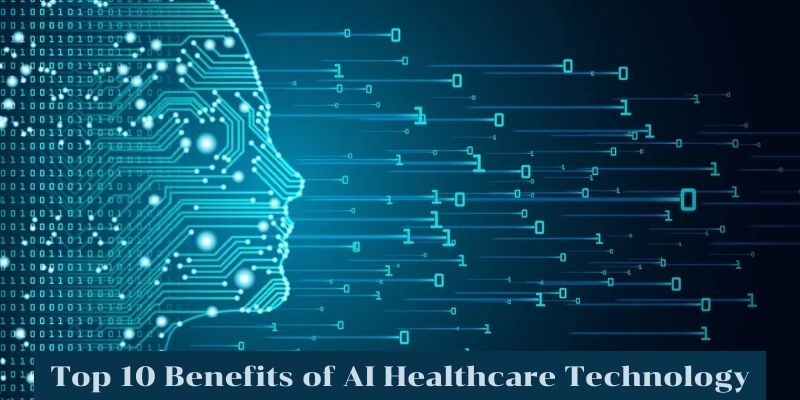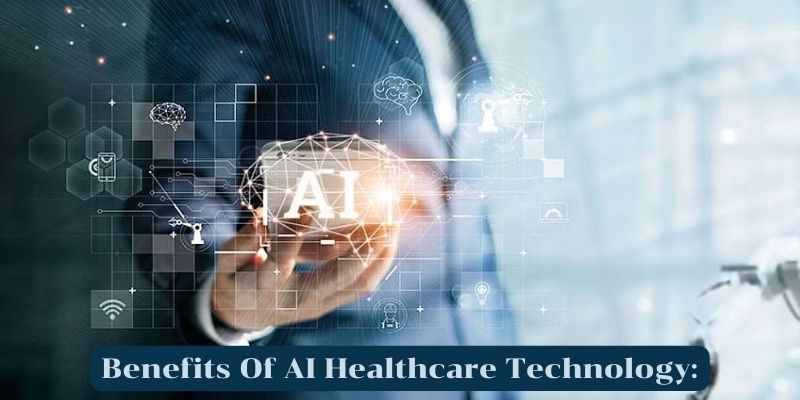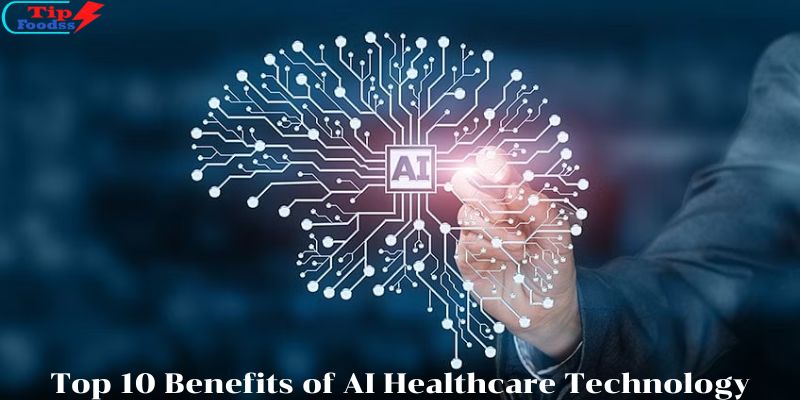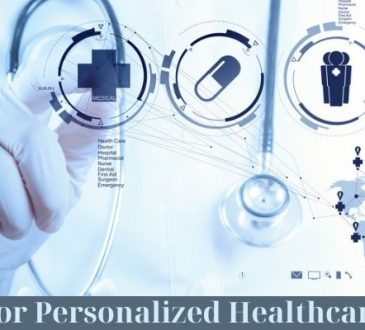Top 10 Benefits of AI Healthcare Technology
Given what we have observed in 2020, it should come as no surprise that the AI healthcare technology sector is one of the biggest and fastest-growing ones. The global healthcare market was almost $8,452 billion in 2018 and is projected to increase to almost $11,909 billion in 2022 at a CAGR of 8.9%. A global epidemic has caused the CAGR % to significantly increase, which has among other things made the push for digital adoption in healthcare even more essential.

In terms of picking a technology, artificial intelligence is all the rage in the medical field. It has become so important that the healthcare sector’s new nervous system has been coined to describe it.The potential for artificial intelligence in healthcare is really diverse and tremendous, and it is already transforming and improving a number of essential processes. AI can assist healthcare professionals in better understanding illnesses and managing patients’ health through chatbots, CAD for diagnosis and analysis, training, and other means. The market for AI-powered healthcare is expected to surpass $34 billion by 2025 due to its adaptability. In this article, tipfoodss.com will discuss top 10 benefits of AI healthcare technology.
Benefits Of AI Healthcare Technology:

- Accurate diagnosis: Human error is frequently caused by insufficient medical records, ineffective case sequencing, and a high number of cases. Advanced machine learning algorithms, however, can make the correct diagnosis once records are fed into a computer, eliminating errors and considerably increasing the efficiency of medical institutions.
- Accelerated drug development: The conventional methods of producing medications can frequently be unreasonably expensive and time-consuming. This is a big problem, especially when a pandemic threatens the entire world and immediate response is required. treatments are typically tested in clinical settings at a cost of $2.6 billion, and only 10% of those treatments are subsequently sold. When researchers were looking into the various functions of yeast in 2007, a robot named Adam quickly went through billions of data points to pinpoint the 19 genes that make up yeast and predict 9 fresh, accurate theories. Eve, the robot companion of Adam, discovered via independent study that triclosan, a substance frequently present in toothpaste, is efficient against parasites that are related to malaria. Such discoveries led to speedier medication manufacture at a fraction of the cost of the past, ensuring the technology’s sustained and expanding significance in the area of medicine.
- Enhanced patient experience: Everyday life is hectic due to overcrowded healthcare facilities, an increasing volume of reports, uncertainty regarding insurance, and other factors. In these circumstances, artificial intelligence (AI) has proven to be a lifesaver by quickly sifting through data, preparing reports, and assisting patients in knowing precisely where to go and who to call on mobile devices. Artificial intelligence (AI) is the foundation of some of the most complicated digital solutions used in the era of remote consulting. AI enables connection and communication as well as exact timing updates, report availability, appointment scheduling, and many other activities. See how Pulsara combined all required healthcare communication into a single, user-friendly platform by using digital technologies in this example. The company’s success and multiple creative award wins were directly attributed to the solution.
- Data security: Protecting sensitive patient data is crucial in the healthcare industry. Rapidly developing AI algorithms assist in encrypting patient data, clinical reports, diagnostic results, and other information to protect it from hacking and store it securely in the cloud for access by patients and professionals anywhere.
- Robot-assisted surgery: For complicated and crucial processes, extreme caution, accuracy, and competence are needed. Robotic surgery employing AI is becoming more and more successful. The robots are equipped with cameras, motorized arms, and surgical tools. They can be made to fit within the human body and provide a crisp, magnified vision of the surgical site that is much better than what the human eye can deliver. These procedures help patients recover more quickly and with less pain than traditional surgeries.
- Remote monitoring: Connected devices have the potential to save lives by using real-time monitoring of situations like heart attacks and asthma attacks. Remote monitoring devices link to and track physical activity using IoT networks. AI can be utilized to make quick decisions, and wearable technologies or mobile applications can be used to obtain data. The market for wearable technology is projected to reach a value of $74 billion by 2026.
- Streamlined training: AI healthcare technology enables healthcare personnel to satisfy training requirements by employing simulations based on a sizable library of scenarios. This aids learners in decision-making and helps them build on earlier responses.
- Risk prediction: employing pattern recognition to estimate a patient’s risk of developing a specific disease. Machine learning in healthcare encourages timely judgments and actions by providing insightful information.
- Smart health insurance: Insurance companies can employ connected devices to gather health-related data for their underwriting, health claims, and risk management procedures. It eliminates false claims and provides open communication between customers and insurers.
- Location tracking and alerts: Smart medical devices enable real-time alerting, tracking, and monitoring, which enables hands-on treatments, increased accuracy, prompt physician intervention, and better overall patient care delivery outcomes. Wheelchairs, scales, nebulizers, pumps, or monitoring devices can all be tracked by sensors, which makes it easier for staff to keep track of them.
Conclusion Benefits of AI Healthcare Technology:
Despite these noteworthy advancements, the use of AI healthcare technology is still in its infancy. Continuous research keeps adding new capabilities to the technology, paving the way for more successes in the coming years across various industries. The vital healthcare industry, which is currently undergoing one of the fastest shifts towards digital, has a lot to gain from AI healthcare technology and ML. Facilities have the potential to significantly improve customer experience, develop new digital business lines, and accelerate research goals, all of which will help make the world a better and safer place for everyone.

As was previously mentioned, it can be difficult to know where to begin and how to create the best transformation strategy. This is where digital native companies like [x]cube LABS come in. Get in contact with us to discuss how implementing AI healthcare technology and other cutting-edge technology might help your healthcare/medical device business.



